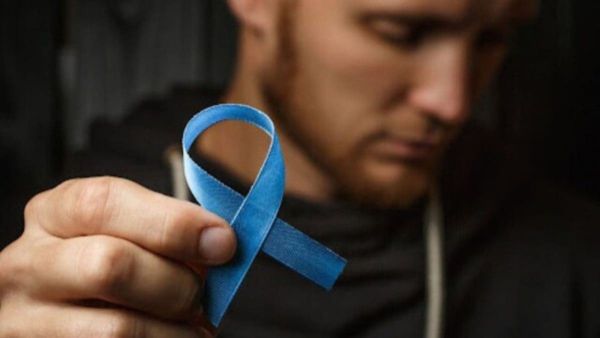
Last Updated:
Early-stage prostate cancer often has no noticeable symptoms, which is why regular screenings are crucial. (News18 Hindi File)
Sex may permeate our popular culture, but conversations about it are still associated with stigma and shame in Indian households. As a result, most individuals dealing with sexual health issues or trying to find information about sex often resort to unverified online sources or follow the unscientific advice of their friends. To address the widespread misinformation about sex, News18.com is running this weekly sex column, titled ‘Let’s Talk Sex’. We hope to initiate conversations about sex through this column and address sexual health issues with scientific insight and nuance.
In this article, we will explain the causes of prostate cancer- erectile dysfunction & explore various treatments for regaining sexual function.
Prostate cancer and erectile dysfunction are two interconnected health issues that many men face as they age. If you’ve been diagnosed with prostate cancer or are experiencing erectile problems, you’re not alone. Understanding the relationship between these conditions, as well as the available treatment options and recovery process, is crucial for maintaining your quality of life and sexual health. Prostate cancer is a serious condition that affects the prostate gland, a small walnut-shaped organ in men responsible for producing seminal fluid. This type of cancer develops when cells in the prostate begin to grow uncontrollably, potentially spreading to other parts of the body if left untreated.
Several factors can increase a man’s risk of developing prostate cancer:
Early-stage prostate cancer often has no noticeable symptoms, which is why regular screenings are crucial. As the disease progresses, men may experience:
Doctors typically use a combination of prostate-specific antigen (PSA) blood tests and digital rectal exams to screen for prostate cancer. If abnormalities are detected, further testing, such as a biopsy, may be necessary for a definitive diagnosis.
Prostate cancer and erectile dysfunction (ED) are closely intertwined due to the prostate gland’s proximity to crucial nerves and blood vessels responsible for erectile function. When prostate cancer develops, it can directly impact these structures, leading to difficulties in achieving or maintaining an erection. Additionally, the treatments for prostate cancer, such as surgery, radiation therapy, or hormone therapy, can further exacerbate the risk of ED.
Beyond the physical aspects, a prostate cancer diagnosis can significantly affect a man’s mental well-being. The stress, anxiety, and depression that often accompany a cancer diagnosis can contribute to erectile dysfunction. These psychological factors can create a cycle of performance anxiety and decreased sexual confidence, further complicating the issue.
Nerve Damage from Surgery: Prostate cancer surgery, particularly radical prostatectomy, can damage the nerves responsible for erections. These nerves run alongside the prostate and may be affected during tumour removal. While nerve-sparing techniques have improved, some degree of nerve injury is often unavoidable, leading to temporary or permanent erectile difficulties.
Radiation Therapy Effects: Radiation treatment, whether external beam or brachytherapy, can cause damage to blood vessels and nerves in the pelvic area. This damage may develop gradually over time, potentially resulting in erectile dysfunction months or even years after treatment. The cumulative effect of radiation can impact the tissue’s ability to support normal erectile function.
Hormonal Therapy Side Effects: Androgen deprivation therapy, commonly used in prostate cancer treatment, can significantly impact sexual function. By reducing testosterone levels, this therapy may lead to a decrease in libido and erectile capabilities. The extent and duration of these effects can vary depending on the specific treatment regimen and individual patient factors.
Medication-Based Approaches: Oral medications like sildenafil (Viagra), tadalafil (Cialis), and vardenafil (Levitra) can be effective for many men post-prostate cancer treatment. These phosphodiesterase type 5 (PDE5) inhibitors work by enhancing blood flow to the penis. Your doctor may recommend trying different options to find the most suitable one for you.
Mechanical Aids and Devices: For those who don’t respond well to oral medications, vacuum erection devices or penile injections can be viable alternatives. Vacuum pumps create negative pressure to draw blood into the penis, while injections deliver vasodilating drugs directly into the erectile tissue. Though these methods require some practice, they can significantly improve erectile function.
Surgical Solutions: In cases where other treatments prove ineffective, penile implants offer a more permanent solution. These surgically inserted devices allow you to control when and how long you have an erection. While invasive, implants boast high satisfaction rates among patients and their partners.
Combination Therapies: Often, a multi-faceted approach yields the best results. Your healthcare provider might recommend combining medications with lifestyle changes, pelvic floor exercises, or counselling to address both physical and psychological aspects of erectile dysfunction post-prostate cancer treatment.
As you navigate the challenges of prostate cancer and erectile dysfunction, remember that you are not alone. With advances in medical treatments and a range of support options available, there is hope for recovery and improved quality of life. Consult your doctor to develop a personalised treatment plan that addresses both your cancer and sexual health concerns.
Be patient with yourself during the recovery process, as regaining erectile function can take time. By staying informed, communicating openly with your partner, and exploring various treatment options, you can work towards restoring intimacy and sexual function after prostate cancer.
Your journey to recovery is unique, but with perseverance and proper care, a fulfilling sex life remains possible.